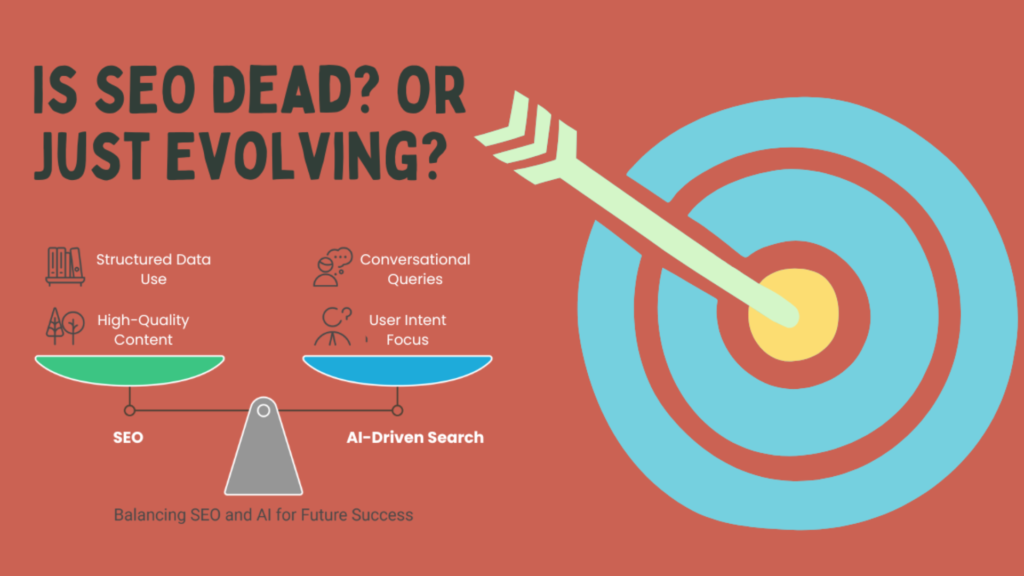Table of Contents
Toggle
SEO has been declared dead so many times it’s practically a meme at this point. But the latest proclamation comes with a new twist: AI is rewriting the rules of search. So, is SEO really on a “dying path,” or are we just entering the next chapter of its evolution?
This debate, sparked by Google’s Search Off the Record podcast, has the SEO world buzzing. Here’s what Google said, what they didn’t, and why it all matters.
AI and SEO: A Collision or a Collaboration?
When John Mueller asked, “Is SEO on a dying path?” the response was surprising. Google’s Gary Illyes dismissed the notion, joking, “SEO has been dying since 2001.” But humor aside, there’s a serious shift happening, driven by AI’s growing role in search.
At the heart of this transformation is Retrieval-Augmented Generation (RAG). Think of RAG as the bridge between traditional SEO and AI-powered search. Here’s how it works:
-
- AI retrieves relevant data from indexed sources.
-
- It processes that data into concise, contextual responses.
-
- The result? AI-generated answers on SERPs.
This means SEO practices like crawling, indexing, and ranking remain crucial. But it’s clear: AI is reshaping the landscape in profound ways.
The Three Big Ways AI Is Changing SEO
Here’s what’s really going on under the hood:
1. Goodbye, Classic SERPs
Remember the “ten blue links”? They’re officially obsolete. AI now dominates the search experience with direct answers. For SEOs and publishers, this means fewer clicks and more pressure to stand out within AI summaries.
2. Hello, Conversational Queries
Users are shifting from short keywords to natural language searches like, “What’s the best way to meal prep for a family of four?” Content must adapt, focusing on intent and context over keyword stuffing.
3. The Wild World of AI Algorithms
AI ranking systems are notoriously opaque and unpredictable. What ranks well today might vanish tomorrow. Stability? Forget about it. Adapting to this volatility is the new normal.
The SEO Community’s Reaction: Anxiety or Opportunity?
Let’s not sugarcoat it—many publishers are struggling. Traffic drops, disappearing relevance, and AI-generated content overshadowing original work are real challenges. But here’s the thing: SEO isn’t dying—it’s evolving. And evolution means opportunity.
How to Stay Ahead in the AI-SEO Era
Staying relevant in the AI-driven SEO landscape requires a blend of technical expertise, strategic adaptation, and creativity. Here’s how you can thrive:
1. Master RAG Optimization
RAG (Retrieval-Augmented Generation) connects SEO with AI. To optimize:
-
- Focus on Structured Data: Use schema markup for rich, retrievable content.
-
- Create Factual Content: Feed AI with well-organized, authoritative data.
-
- Ensure Crawlability: A clean, accessible site is vital for AI-driven indexing.
2. Shift from Keywords to Intent
-
- Leverage Long-Tail Keywords: Reflect specific user needs, e.g., “best vegan meals for athletes.”
-
- Adapt for Voice Search: Frame content conversationally.
-
- Answer User Questions Directly: Address real-life scenarios with actionable advice.
3. Stay Agile Amid Algorithmic Changes
-
- Monitor Trends: Stay updated on SERP fluctuations.
-
- Experiment with Formats: Use FAQs, tables, and bullet points for AI-friendly content.
-
- Refresh Regularly: Keep evergreen content updated to match shifting user intent.
4. Build E-E-A-T: Expertise, Experience, Authoritativeness, Trustworthiness
-
- Highlight Expertise: Showcase credentials and unique insights.
-
- Earn Backlinks: Collaborate with authoritative domains.
-
- Deliver First-Hand Insights: Share original data and case studies.
5. Optimize for Zero-Click Searches
-
- Craft Featured Snippets: Summarize solutions in structured, scannable formats.
-
- Add Local SEO Elements: Optimize for “near me” searches with accurate business profiles.
6. Adapt Content Diversity
-
- Video Content: AI favors well-tagged videos.
-
- Interactive Content: Add infographics, quizzes, and calculators.
-
- Combine Long and Short Formats: Offer detailed guides alongside quick answers.
7. Leverage Analytics for AI Insights
-
- Analyze Behavior: Use heatmaps and analytics to track engagement.
-
- Spot Content Gaps: Address underserved queries.
-
- Optimize CTAs: Align calls to action with user intent.
8. Prepare for Future Innovations
-
- Voice AI: Optimize for conversational assistants.
-
- Diversify Traffic Sources: Rely less on organic search and build multi-channel strategies.
-
- Stay Curious: Follow industry news to anticipate the next wave of AI tools.
Is SEO Dying? Or Are We Just Scared of Change?
Here’s the kicker: Google insists SEO isn’t going anywhere. Crawling, indexing, and ranking remain foundational. But clinging to outdated strategies? That’s the real dead end.
The future of SEO demands agility, creativity, and a willingness to experiment. Whether AI is a threat or an opportunity depends on how ready you are to evolve. What’s your next move? Let’s discuss.
